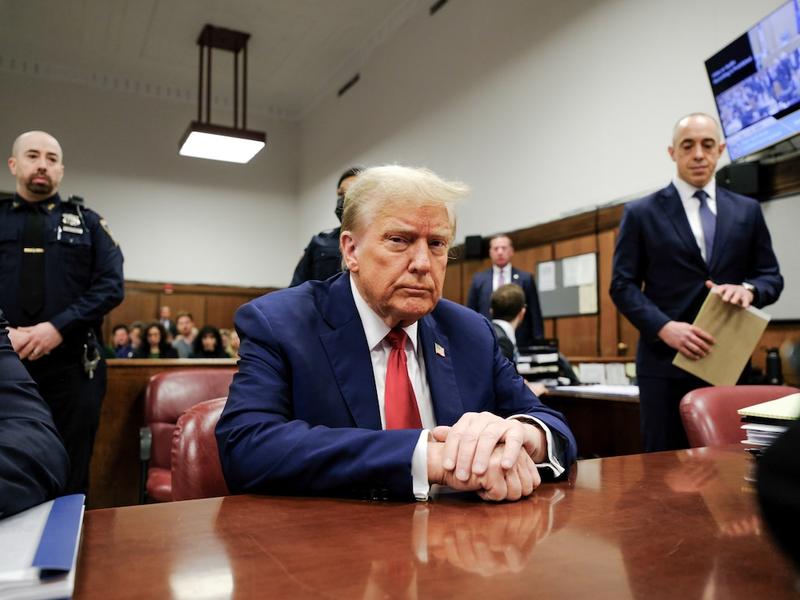
This week’s developments—the guilty verdict of Paul Manafort, President Trump’s former campaign head found guilty on tax and bank-fraud charges, and the guilty plea by Michael Cohen, Trump’s longtime personal lawyer, for campaign-finance-law violations which he says were directed by Trump—have to leave Republicans unnerved. And then there was Wednesday’s release of a Fox News poll showing Republicans trailing on the generic congressional-ballot test by 11 points, making the situation for Republicans hoping to retain the House majority look even worse than before.
The Fox News poll of 1,009 registered voters conducted Aug. 19-21, mostly before the plea deal and guilty verdict were made public, showed Democrats with 49 percent of the vote, to 38 percent for Republicans. This was up from a Democratic lead of 8 points in the July Fox poll, and 9 points in June. When the new poll’s sample was narrowed to likely voters—those saying they were “extremely interested” in the election—the Democratic lead exploded to 18 points, 56 to 38 percent. The RealClearPolitics average shows Democrats up by 7.1 points. Even with the advantages for Republicans in district boundaries and natural-population patterns, this makes a House turnover quite likely.
The difference between a bad election night for Republicans and a horrific one would be if those Republicans who are not from either the adamant pro-Trump tea-party faction and equally fervent conservative evangelical Christian element the two groups that constitute the bulk of Trump core support—become disillusioned and opt to stay home. The passionate Trump base shows no signs of either abandoning their president or staying home in November. But that leaves a substantial element of Republicans who are not part of the Trump’s base, who do not share their enthusiasm for the 45th president. It is quite plausible that more than a few of those will vote with their seats and stay home. Democrats have no intensity problem, while many conventional Republicans do.
But that still leaves the question of the impact of recent developments on Trump and the immediate future of his presidency. Many compare his situation with that of President Nixon during Watergate. It’s important to remember that since 1973, the Justice Department’s Office of Legal Counsel has maintained that “the indictment or criminal prosecution of a sitting president would unconstitutionally undermine the capacity of the executive branch to perform its constitutionally assigned functions.” The issue came up during an examination of the legal issues when Vice President Spiro Agnew was under investigation, and subsequently resigned, after pleading no contest to a single charge of tax evasion (the original charges involved bribery and extortion). The finding was that “all federal civil officers except the president are subject to indictment and criminal prosecution while still in office; the President is uniquely immune from such process.”
Presumably this policy was a factor in Whitewater special prosecutor Ken Starr’s decision to issue a 445-page report on Sept. 9, 1998 rather than indict President Clinton, when he surely had the goods to charge him for perjury and obstruction of justice in the Monica Lewinsky affair. Instead, Starr offered 11 possible grounds for impeachment. The OLC revisited the issue in 2000 and concluded that “we believe that the conclusion reached by the Department in 1973 still represents the best interpretation of the Constitution.”
Others are suggesting that the more appropriate remedy for Democrats to push for is impeachment. But it’s safe to say that in this era of tribal, hyper-partisanship, there is no chance of the House voting out articles of impeachment, before or after the midterm elections, as long as Republicans hold the majority. And even if Democrats win a sufficient majority in the House in November to pass articles of impeachment next year, the difficulty of securing 67 votes for conviction in the Senate makes it effectively an exercise in futility. Keeping in mind that Democrats have 49 seats in the Senate, even if they all voted to convict, including Alabama’s Doug Jones (who is up for reelection in 2020), and win all 35 Senate races this year (an impossibility), that would still get them to just 58 seats.
Now remember that Trump critics Bob Corker (Tennessee) and Jeff Flake (Arizona) won’t be senators next year, so pretty much the only Republican who plausibly might vote for conviction would be Susan Collins, who is also up for reelection in 2020. Theoretically, Collins could run as an independent as her Maine colleague Angus King does, thus avoiding a primary challenge that would certainly result. In short, no matter what evidence against Trump may or may not exist, indictment or removal from office by way of a Senate impeachment conviction seems extremely unlikely. A more prudent course for Democrats, whether they win House and Senate majorities or not, would be a censure.
This story was originally published on nationaljournal.com on August 25, 2018










Subscribe Today
Our subscribers have first access to individual race pages for each House, Senate and Governors race, which will include race ratings (each race is rated on a seven-point scale) and a narrative analysis pertaining to that race.